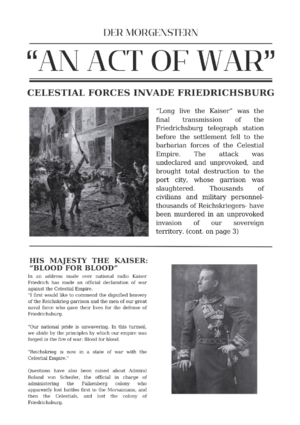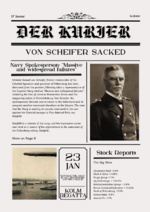Qanteng War
| Qanteng War | |||||
|---|---|---|---|---|---|
| |||||
| Belligerents | |||||
|
Sub-Provinces of the Empire
|
Colonies
| ||||
| Commanders and leaders | |||||
|
Wu Tseun Thomas Becker Morat Mast Laurent Mast Jesse O'Rourke Wei Lanceson Jr |
Roland von Scheifer (dismissed) Felix von Katzfeld Kaiser Friedrich VI | ||||
The Qanteng War, also known as the Reichskrieger-Celestial War was a conflict between the Empire of Reichskrieg and The Celestial Empire, over the former's colonies in the Celestial Empire. It came on the heels of the Coup of January 14 and the subsequent Celestial Interregnum which rocked the crumbling Celestial Empire. Notably, this conflict marked the accelerated decline of the Celestial Empire, which had until then stood for five centuries under the unwavering rule of the god-emperor Ren Osarrus and his twenty-three successors both born and reincarnated. The province of Elodia launched an invasion into the port of Friedrichsburg, then held by the Reichskrieger colony of Falkenberg, failing to notify or seek approval from the imperial government before doing so.
Situation before the war
The Celestial Empire had entered the 20th century in a particularly dire state. Its wars with the great powers of Valmere several decades ago had kneecapped the empire and on the Celestial borders, smugglers from Dayan imported a narcotic from the vast empire called D'yavod to sell to the Celestial citizens for profit, causing a drug epidemic. Elsewhere, subjects of the Empire began to whisper of rebellion, and conspiracies brewed among Ren Osarrus XXIV's advisors, most of whom wished to take power for themselves.
In January of 1910, Grand Admiral James Gong launched a coup. His military forces overtook the imperial capital of Nhasa, while his men murdered Ren Osarrus XXIV and massacred the Imperial Diet. With virtually no obstacles to his usurpation of the throne left, Gong declared himself the acting regent of the Celestial Empire.
However, Gong's regency was short-lived and would be marked with disaster. In mid-1910, Gong lost much of the imperial treasury when he sent the ship "Aftalia" on a diplomatic mission to the great powers in Valmere, hoping to solidify power. However, the Aftalia was lost in a storm with the majority of its passengers, and a large portion of the empire's wealth was lost to the sea.
Concurrently, the province of Kalquen staged a rebellion, overthrowing and executing the imperial governor. Gong failed to put down, or even address at all, this insurrection.
In November of 1910, Gong visited the city of Falkenberg, which had recently been captured by the forces of Reichskrieg and turned into yet another colony. There, he made a highly-controversial deal with the then-governor of Falkenberg, Admiral Roland von Scheifer, to obtain several dozen Reichskrieger artillery pieces in exchange for Falkenberg's annexation of Qanteng, a port to the north of Nhasa and adjacent to the province of Luhai.
Gong would then declare himself to be Ren Osarrus XXV. This move would not earn him recognition from the Empire.
In January of 1910, Gong's reign came to an end when a multi-province coalition invaded the capital of Nhasa. Gong was killed in the fighting, and a provisional government was established. At the same time, Admiral von Scheifer of Falkenberg invaded the province of Luhai seeking to take it as another colony. This sparked the Luhai Crisis, which resulted in Falkenberg's expulsion from the province and yet more foreign intervention from the powers of Morsain and Great Tarst.
After the crisis, the imperial province of Elodia saw fit to take the port of Qanteng, now named Friedrichsburg.
War begins
On January 16, 1911, Elodian forces began shelling the port of Friedrichsburg, commencing hostilities with the colony of Falkenberg. Thus the Battle of Qanteng commenced. This military campaign also illuminated the disunity of the Celestial Empire, as the province of Swarzia declared war on Elodia in turn, their reasoning being that Elodia's actions would provoke a war with Reichskrieg.
It is claimed that contrary to common belief, several rogue Elodian artillery brigades shelled Friedrichsburg without official approval, and thus caused the battle and the war.
The Battle of Qanteng lasted a day, and the result was the massacre of the Reichskrieger garrison stationed there, and substantial civilian and military casualties for both sides. The city was almost completely destroyed in the fighting.
News reached Reichskrieg some hours later, as the Qanteng telegraph station was able to relay the information to their homeland before they were overrun.
Upon receiving news of the invasion, the Reichskrieger public erupted in outrage at the incident, and demanded war with the Celestial Empire as a whole. Their demands were met as Kaiser Friedrich VI made an address over the national radio, declaring war on the Celestial Empire.
Soon after, on the 19th of January, Vice Admiral Felix Katzfeld of Reichskrieg was sent to the colony of Falkenberg. Upon arrival, he stripped Roland von Scheifer of his command and took charge of the war effort, as Reichskrieger troops and ships began arriving in great force. Von Scheifer would be forced to return to the homeland and be reassigned to another command elsewhere.
Meanwhile, the rest of the foreign powers- Alstin, Great Tarst, Morsain, et cetera- met in Great Tarst the following month to discuss the crisis with the Celestial Empire.
The Westell Conference
Swarzia, in an attempt to prevent Elodia from taking Friedrichsburg, had marched its army north to Nhasa as fast as possible. Only, they were stopped halfway to learn that Friedrichsburg had fallen, and were informed some days later that Reichskrieg had, in fact, declared war.
Following this, Swarzia officially rescinded its declaration of war, and returned their army to their quarters.
After this, Supreme Regent Jesse O'Rourke dispatched the newly-appointed Master of the Sword Morat Mast to the Tarstian capital of Westell, to negotiate with the foreign powers and come to an agreement.
Mast had garnered a somewhat-exaggerated reputation abroad as a fearsome diplomat and great warrior, with claims of slaying the would-be Emperor Gong himself. It is no doubt that such a reputation was built from him giving out inaccurate statements to foreign reporters during the Qanteng Crisis.
Regardless, Mast was a fully capable negotiator, if not an eccentric character.
The Westell Conference included delegates from all the major powers of Valmere, one of the first times the Celestial Empire had landed in a major position on the world stage. The attendees of the Conference included delegations from Reichskrieg, Tarst, Alstin, Morsain, and Vrankin. Notably, Dayan was not present, or involved in these negotiations (An unsurprising thing, given the isolationist policies of the Overtsardom and the Dayanis' hostility towards the rest of Valmere.) In addition, the conference was mediated by the newly-elected Pope Benjamin XIII.
During the conference, Morat Mast lived up to his reputation by out-maneuvering the Reichskrieger diplomat, Mark Johann von Sow, and pushing through an agreement more favourable to the Celestial Empire; after that, war would seemingly be averted for the time being.
It was, however, also revealed to the world the true extend of the decay in the Celestial Empire: Mast admitted that the recent series of events with Gong had left the Empire leaderless and decentralized with each province free to do as they wished, and a central government struggling to recover from the turmoil.
Much to Kaiser Friedrich's anger, Reichskrieg failed to achieve all of its goals during the conference.
"It's worth noting... It's worth noting that we are a state without an Emperor. Our government is merely provisional. Because of Reichskrieg's actions with regards to Qanteng, Luhai, and the support they gave for Gong's coup and civil war, and now their impending invasion, it is impossible for us to prevent the provinces from acting out."
Morat Mast, Westell Conference
The terms of the agreement drafted during the Westell Conference were, as follows;
- Elodia province would be made a Protectorate of Reichskrieg, with international oversight. The exception to this would be the eastern coastline, which would remain Celestial land.
- Reichskrieg would issue an apology for instigating the Gong, Luhai, and Qanteng crises.
- Reichskrieg would annex Qanteng.
- Reichskrieg would recognize the Luhai International Zone.
- The Aodi Ecclesiastical Province would be created in North Luhai, a Papal colony.
- All who participated in the Qanteng attack would be extradited to face trial in Reichskrieg
- Reichskrieg would pledge to initiate no further hostile actions, lest their lordship over Elodia be revoked.
- Reichskrieg would establish a permanent embassy in Cigallo.
Notably, this agreement was much to the detriment of the province of Elodia, who then conspired with Morsainian authorities to turn against the Celestial Empire and Reichskrieg in order to prevent their subjugation.

